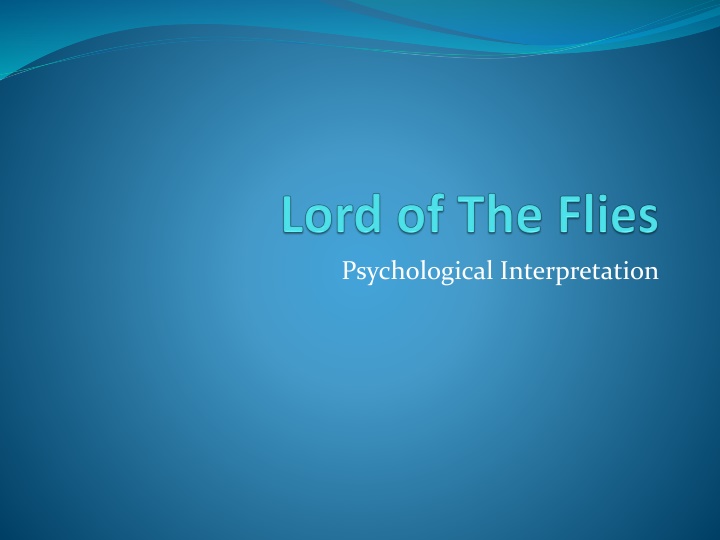
Psychological Interpretation in Lord of the Flies: Freudian and Political Themes
Explore the Freudian and political interpretations in William Golding's novel, Lord of the Flies. Discover how Sigmund Freud's id, ego, and superego theory influences the characters and themes in the book, alongside the exploration of power dynamics among the boys on the island. Uncover the biblical parallels and moral allegories woven into the narrative, shedding light on human nature and societal structures.
Download Presentation

Please find below an Image/Link to download the presentation.
The content on the website is provided AS IS for your information and personal use only. It may not be sold, licensed, or shared on other websites without obtaining consent from the author. If you encounter any issues during the download, it is possible that the publisher has removed the file from their server.
You are allowed to download the files provided on this website for personal or commercial use, subject to the condition that they are used lawfully. All files are the property of their respective owners.
The content on the website is provided AS IS for your information and personal use only. It may not be sold, licensed, or shared on other websites without obtaining consent from the author.
E N D
Presentation Transcript
Sigmund Freud, theorized the structural model of the human psyche in three parts: the id, the ego and the superego. The id is the psyches basis composed of naturalistic urges that are the effectsof the id s pleasure principle the ego is ruled by the reality principle and intends to satisfy thecravings of the id by means of socially-acceptable methods, behavioural and moral codes set by guardians and society contained within the superego. Many authors haveadopted this psychological theory into their work through their characters; in Lord of the Flies William Golding uses Jack, Piggy, and Simon to suggest the novel s plausible connection to thesubconscious triad. Lord of the Flies can be interpreted as a psychological allegory to representthe Freudian aspects of the human psychic apparatus: the id, the ego, and the superego. determined by the strict
Lord of the Flies : Political Interpretation One important theme in William Golding s novel Lord of the Flies is power (Poppe 6). Golding considers the desire for power and destruction as something innate and justifies this by stating that humans simply follow certain patterns in their behavior, which they have inherited from their ancestors (Niven 38). The boys in Lord of the Flies illustrate this very clearly, copying the behavior of their parents: competing, fighting and even killing each other for power. They form two groups, each following a different power system. Golding s description of the boys power systems and their situation on the island is very vivid. Firstly, Golding had been a teacher and therefore was very accustomed to the way children behave in certain situations, and his experiences during the Second World War showed him very clearly what humans are capable of doing. He had lived through the horrors of the war as a naval Commander, before he was confronted with the start of the Cold War (Poppe 20). He wrote Lord of the Flies as a response to these times, which had seen a conflict between democratic and totalitarian ideals. As Woodward argues persuasively, The conflict which Golding so superbly articulates, is between the order of democratically rules and the expression of aggressive instincts (93).
Many critics have characterized Lord of the Flies as a retelling of episodes from the Bible. While that description may be an oversimplification, the novel does echo certain Christian images and themes. The novel s biblical parallels enhance its moral themes but are not necessarily the primary key to interpreting the story. Lord of the Flies by William Golding is rife with references to biblical themes. The major religious allegory surrounds Simon and his search for the truth. Once Simon has talked to the Lord of the Flies, he climbs the mountain in search of "the beast." What he discovers is that the beast is only a dead parachutist. When he runs down the mountain to tell the truth to the boys, they are in the middle of a ritualistic dance. They mistake Simon for the beast and kill him. This mirrors two Biblical stories. Moses went up to the mountain where God delivered the truth in the form of the 10 commandments. When Moses descended the mountain, he found his people had made an idol of gold shaped as a calf and were dancing and partying around the calf. Moses was furious and broke the stones which contained the 10 commandments. Unlike Simon, Moses was not killed. However, according to the New Testament, when Jesus came down from Heaven in order to deliver the truth to mankind, he was mistaken for a false prophet and executed. This mirrors Simon's ultimate fate. Thus, Simon is known in literature as a Christ- figure , a character who sacrifices his own life and that life generally affects the protagonist in some great way.
